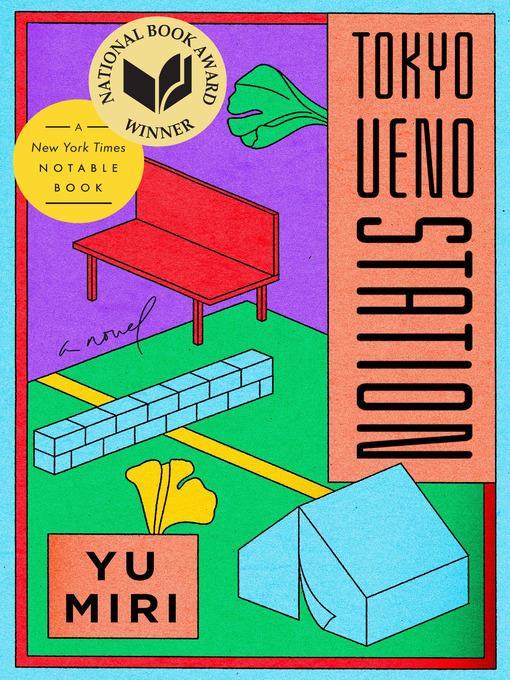
Tokyo Ueno Station
A Novel
کتاب های مرتبط
- اطلاعات
- نقد و بررسی
- دیدگاه کاربران
نقد و بررسی

Starred review from April 13, 2020
In Yu’s coolly meditative, subtly spectral tale (after Gold Rush), Kazu, a former denizen of a Tokyo tent city, looks mournfully on the past. Kazu lingers around Ueno Park in present-day Tokyo, where he once spent several years camping among the homeless, and spends the days people-watching and reminiscing. He recalls his birth in 1933 in rural Soma; remembers how he sought work for long stretches away from his family, including a grueling stint doing construction work in preparation for the 1964 Tokyo Olympics; and replays his response to the death of his only son at 21, in 1981 (“My shock, my grief, my anger were all so great that crying felt inadequate”), which led him to drift away and spend more time alone in Tokyo. After two decades pass, he winds up living in the park. The banal conversations he overhears in the present from middle-class park visitors clash with the bleak recollections of his perpetual misfortune, along with the fraught history of the park as a mass grave and site of rebellion, details that emerge in Kazu’s remembered conversations with a fellow homeless man. The novel’s melding of memory and observation builds toward Kazu’s temporary eviction from the park in 2006. Yu’s spare, empathetic prose beautifully expresses Kazu’s perspective on the passage of time; he feels a “constant absence from the present, an anger toward the future.” This slim but sprawling tale finds a deeply sympathetic hero in a man who feels displaced and longs for connection after it’s too late.

April 15, 2020
A ghost haunts a Tokyo train station, with history and tragedy much on his mind. Kazu, the late narrator of Yu's second novel to be translated into English, spent his life as an itinerant laborer, one of eight children who moved from his home in Fukushima to help build facilities for the 1964 Tokyo Olympics. (Fukushima was the epicenter of the 2011 nuclear power-plant disaster, which also plays into the story.) Kazu recalls pieces of his life in digressive fashion as he wanders the grounds of a homeless encampment near a busy Tokyo train station. He listens in on conversations and recalls how he himself wound up residing there. His mood is scattered ("noises, colors, and smells are all mixed up, gradually fading away, shrinking"), but it's soon clear in this brief, piercing novel that Kazu is circling around a series of heartbreaks, and when Yu finally hits on them--Kazu's separation from his family for work, the death of his son, the financial desperation that led to his homelessness--the novel gains a pathos and focus that justify its more abstract and lyrical early passages. As Kazu chronicles the funeral rites and his own fallen fortunes, the novel becomes a somber cross section of Japanese society, from the underclass to salarymen to the royal family to the homeless people subject to the whims of government (like the potential closure of the camp due to the 2020 Tokyo Olympics). Yu's first novel in English, Gold Rush (2002), was a hyperviolent, American Psycho-esque tale of Yokohama street youth. This more restrained and mature novel is a subtle series of snapshots of "someone who has lost the capacity to exist, now ceaselessly thinking, ceaselessly feeling." A gemlike, melancholy novel infused with personal and national history.
COPYRIGHT(2020) Kirkus Reviews, ALL RIGHTS RESERVED.

Starred review from April 1, 2020
I did not live with intent, I only lived. But that's all over now. Kazu is dead, but his spirit can't rest. As he wanders through Tokyo's Imperial Gift Park?where he last lived as a homeless wanderer?memories, visions, and hauntings reveal his past. That his 1933 birth coincided with Emperor Akihito's, followed by the birth of their respective sons on the same day in 1960, was supposed to be a blessing, but tragedy repeatedly marked the decades: I had no luck, Kazu unblinkingly insists. Driven by necessity rather than autonomy, Kazu worked as a laborer to provide for his family, resulting in years of disorienting isolation and demanding separation from the very people for whom he longed for most. Then death came too early for his son, and again too soon for his wife, depriving him of the comfortable companionship that should have been his reward in retirement. Difficulty and detachment marked his final years. Yu (Gold Rush, 2002), an ethnic Korean in Japan, is no stranger to modern society's traps driven by nationalism, capitalism, classism, sexism. Her anglophoned latest (gratitude to translator Giles for providing fluent accessibility) is a surreal fable of splintered families, disintegrating relationships, and the casual devaluation of humanity.(Reprinted with permission of Booklist, copyright 2020, American Library Association.)

























دیدگاه کاربران